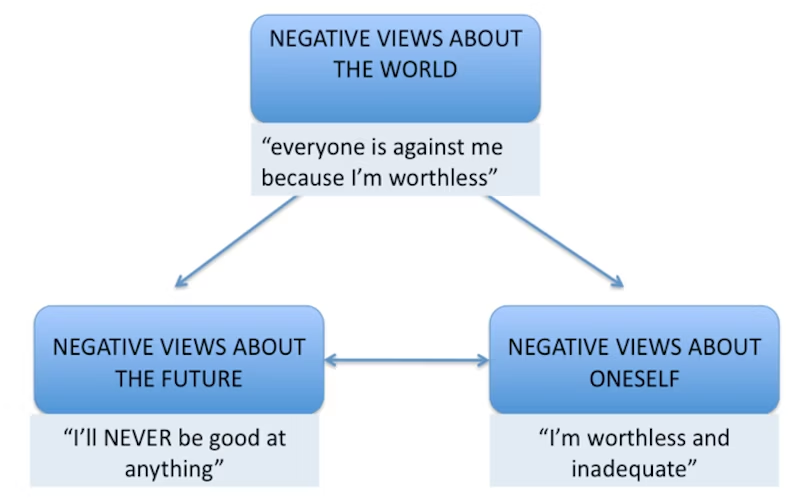Cognitive approach to explain depression
1/7
There's no tags or description
Looks like no tags are added yet.
Name | Mastery | Learn | Test | Matching | Spaced |
|---|
No study sessions yet.
8 Terms
Beck (1967)
•Beck suggested that there is a cognitive explanation as to why some people are more vulnerable to depression than others.
•A person’s cognitions that create this vulnerability (how they think)
•He suggested three parts to this cognitive vulnerability:
- Faulty information processing
- Negative self-schemas
- The negative triad
faulty information processing
•Beck believed that people who are depressed make fundamental errors in logic.
•Beck proposed that depressed people tend to selectively attend to the negative aspects of a situation and ignore the positive aspects.
•There is a tendency to blow small problems out of proportion with thinking in terms of black and white and ignoring the middle ground; you are a success or a failure, rather than not good at some things but OK at others
e.g. “I won £1 million on the Lottery which is so unfair because last week someone won £10 million”
negative self-schemas
•A schema is a building block of knowledge, a ‘package’ of ideas and information that has developed with experience
•Schemas act as a mental framework for the interpretation of sensory information
•A self-schema is a package of ideas that we have about ourselves.
•We use schemas to interpret the world, so if we have a negative self-schema we interpret all information about ourselves in a negative way.
•People who have become depressed have developed negative self-schemas.
Weissman and Beck (1978)
AIM: To investigate the thought processes of depressed people to establish if they make use of negative schemas
METHOD: Thought processes were measured using the dysfunctional attitude scale (DAS). Participants were asked to fill in a questionnaire by ticking whether they agreed or disagreed with a set of statements. For example, ‘people will probably think less of me if I make a mistake’.
RESULT: They found that depressed participants made more negative assessments than non-depressed people. When given some therapy to challenge and change their negative schemas there was an improvement in their self-ratings
CONCLUSION: Depression involves the use of negative schemas
Beck’s negative triad
•Beck built on the idea of maladaptive responses, and suggested that people with depression become trapped in a cycle of negative thoughts.
•They have a tendency to view themselves, the world and the future in pessimistic ways – the triad of impairments
•Negative view of the self (I am a failure)
•Negative view of the world (the world is a cold hard place)
•Negative view of the future (there isn’t much chance that the economy will really get better)

Ellis (1962)
•Ellis proposed that good mental health is the result of rational thinking (defined as thinking in ways that allow people to be happy and free from pain).
•Conditions like anxiety and depression (poor mental health) result from irrational thinking.
•Ellis defined irrational thoughts, not as illogical or unrealistic thoughts, but as any thoughts that interfere with us being happy and free of pain.
Ellis’ ABC model
Ellis used the ABC model to explain how irrational thoughts affect our behaviour and emotional state.
(A) Activating event
(B) Beliefs
(C) Consequences
If beliefs are subject to cognitive biases (in the same way as Beck’s) then they can cause irrational thinking which may produce undesirable behaviour.
